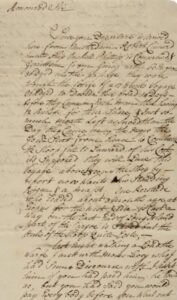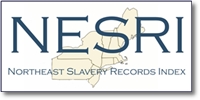Mayor Stephen (Stephanus) Bayard, 1744-1747: Bayard (1700-1757) was a merchant who participated in the slave and sugar trade, and his grandfather Nicholas Bayard also served as mayor. His business partners included brothers Philip and Robert Livingston, some of New York’s most well-known slave traders.[1] Bayard’s brother Nicholas (1698-1765) opened the first sugar mill in New York City in 1730.[2]
Bayard invested in seven ships that transported enslaved people from the Caribbean to New York from 1724 to 1742. In 1740, twenty enslaved persons disembarked from the Antigua Packet at Perth Amboy and then four in New York along with cargo of ginger and cotton wool. Perth Amboy served as an important port for New Jersey’s merchants and slave trade.
On March 12, 1724, Bayard married Alida Vetch, granddaughter of Robert Livingston and daughter of Alida Schuyler Van Rensselaer. Their marriage united the wealthy Stuyvesant, Bayard, Livingston, and Van Rensselaer families. After their marriage, they lived in a Dock Street house given to them by Robert Livingston. Alida brought an enslaved girl, Dina, as part of her dowry.[3] On August 1, 1722, Robert Livingston noted that he charged Alida’s father, Sameul Vetch, for “1 negro girl of 5 years of age called Dina,” who was given to Alida.[4]

Stephen Bayard to Robert Livingston, November 12, 1725, Gilder Lehrman Collection
Involvement with Slavery:
- From the transcript of the 1741 trial, Bayard had an enslaved man named Ben, who was indicted but fled and could not be found.[5]
- In his 1753 will, Bayard bequeathed to his daughter Margaret “two negro or Indian slaves one named Pashanse and the other Pegey and the children they may get to be delivered” when Margaret comes of age or is married. He left other enslaved persons to his sons William and Robert. They are listed among other possessions: “plates, furniture, negro slaves, cattle, horses, sheep, and swine…”[6]
- On November 12, 1725, Stephen wrote to Robert Livingston about the death of thirty enslaved people out of sixty being transported on the Onckell Philips to New York.[7] He wrote: “Since your Departure is arrived here from Amsterdam Robert Linnerd in Wch ship Onckell Phillip is Concerned, & Gerrittsen from Gersey with 60 negroes 30 dyed in the passage, they ware trough the fatige of a 17 weeks Voyage..”[8]
- On June 8, 1738, The New-York Weekly Journal reported that the brigantine Turtle Dove—Bayard was an investor in the ship—was captured by pirates near Cape Nichola (Hispaniola). The ship entered New York with ten enslaved people, sugar, and molasses. There is no mention of the enslaved, but Captain Daniel Bloom and crew sought restitution after they were robbed and “used with much inhumanity at sea and shore” and the pirates looted “several bags of money” from the ship belonging to merchants. The crew did not receive restitution.[9]
Investments in Ships that Transported Enslaved
| Ship | Dates of Voyage or in NY Port | Ports of Call | Enslaved Purchased | Cargo | Co-Investors |
| Allida | 11/30/1724 | St. Thomas | 1 | 104 casks sugar, 49 bags cotton wool, five casks coconuts, soap | Abraham De Peyster, Jr. (son of mayor), Frederick Van Cortlandt (son of mayor Jacobus), John Brown, and Rip Van Dam |
| Ranger | 5/18/1727 | Antigua | 2 | 76 casks rum, 26 casks brown sugar, molasses, two pipes Madeira wine | Peter Bayard, Henry Cuyler, and Joseph Royall |
| Black Eyed Susan | 9/3/1728 | Curaçao | 1 | 32 casks & 22 bags coconuts, two bags cotton wool, fourteen casks pimento, one cask old iron | His brothers Nicholas and Samuel, Jr. Bayard, and Rip Van Dam |
| Byam | 9/28/1730 | Antigua | 2 | Rum, sugar, molasses | Michael Thodey, Nathaniel Gilbert, and Philip Livingston |
| Byam | 4/21/1731 | Antigua | 4 | Three casks rum, at least 29 casks molasses, sugar | Michael Thodey, Nathaniel Gilbert, and Philip Livingston |
| Francis | 2/5/1730 | Antigua | 9 | One cask rum, European goods, four casks cotton wool, 32 casks molasses | William Smith, Nathaniel Gilbert, and Philip Livingston |
| Francis | 6/26/1730 | Antigua | 16 | Rum, sugar, European goods | William Smith, Nathaniel Gilbert, and Philip Livingston |
| Francis | 4/26/1731 | Antigua | 6 | 92 casks rum, five casks apothecary wares, sugar, molasses | William Smith, Nathaniel Gilbert, and Philip Livingston |
| Francis | 9/15/1731 | Antigua | 24 | 34 casks rum, sugar | William Smith, Nathaniel Gilbert, and Philip Livingston |
| Turtle Dove | 6/8/1738 | Jamaica | 10 | Sugar, molasses | Nathaniel Marston and James Searle |
| Antigua Packet | 11/15/1739 | Antigua | 2 | Rum, 50 barrels sugar | His brother Nicholas Bayard, Henry Lawrence, Abraham Lynsom, William Turnell and Nathaniel Marston |
| Antigua Packet | 6/16/1740 (Perth Amboy then NY) | Antigua | 24: 20 at Perth Amboy, 4 at NY | 76 bags ginger, one packet cotton wool | His brother Nicholas Bayard, Henry Lawrence, Abraham Lynsom, William Turnell and Nathaniel Marston |
| Antigua Packet | 11/18/1740 | Antigua | 2 | Rum, sugar, molasses, duck | His brother Nicholas Bayard, Henry Lawrence, Abraham Lynsom, William Turnell and Nathaniel Marston |
| Antigua Packet | 7/26/1742 | Antigua | 4 | 33 casks sugar, six casks rum, European prize goods | His brother Nicholas Bayard, Henry Lawrence, Abraham Lynsom, William Turnell and Nathaniel Marston |
[1] “New Yorkers Invest in Slavery,” Northeast Slavery Records Index
[2] Merchants & Empire, p.179
[3] Bound by Bondage, p.119
[4] Bound by Bondage, p.113
[5] Univ. of Michigan, 1741 trial transcript; Lepore database, worksheet titled Persons
[6] New York Wills and Administrations, Vol 017, 0019-0021, 1749-1760, Will Date 31 Jan 1753, Probate Date, 1 Mar 1757, Ancestry.com, digital p.500-01
[7] Bound by Bondage, p.119
[8] Stephen Bayard to Robert Livingston, November 12, 1725, The Gilder Lehrman Institute of American History, link
[9] New-York Weekly Journal, June 8, 1738; Intra American Slave Voyage Database #107865; Donnan, p.502
Ship investments: #107501, Donnan p.477; CO 5/1223_003, 77; #107573, p.482, CO 5/1224 Part 1, 60; #107614, p.484; Jordaan, Han, “The Curaçao Slave Market: From Asiento Trade to Free Trade,” CO 5/1224 Part 2, 125; #107711, p.491, CO 5/1224, 226; #107716, p.491, CO 5/1225_001, 2; #107675, p.488, CO 5/1224 Part 2, 196; #107693, p.490, CO 5/1224, 221; #107717, p.491, CO 5/1225 Part 1, 2; #107736, p.492, CO 5/1225, Part 1, 11; #107865, p.502, CO 5/1226, 5; #107900, p.505, CO 5/1226, 69; #107151, p.505, 512: NJ; CO 5/1226, 95; CO 5/1035_03, 72 (Perth Amboy); #107921, p.506, CO 5/1226, 126; #107946, p.508, CO 5/1226, 220
Copyright 2025 Paul Hortenstine



